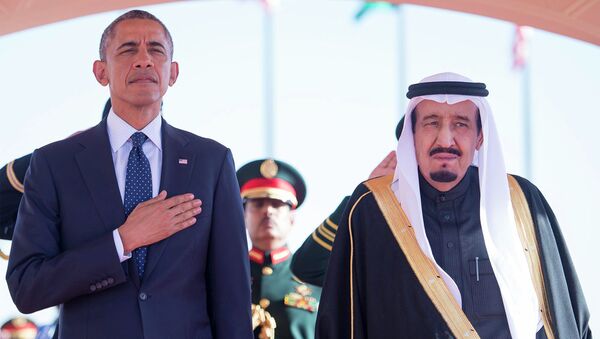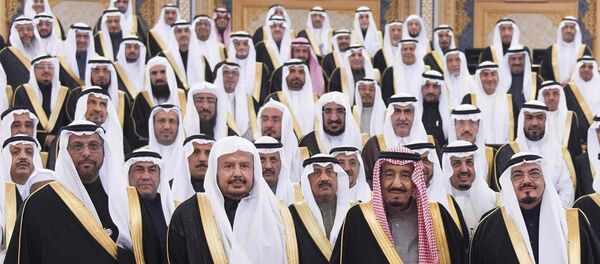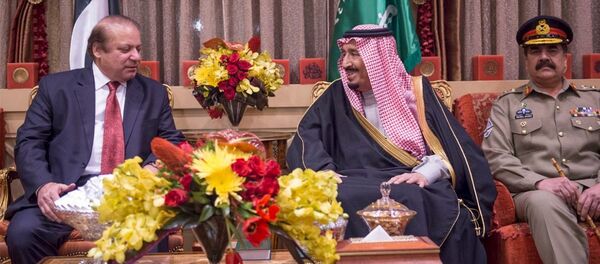The US-Iranian nuclear deal has given the entire Middle Eastern political landscape quite a jolt, according to Salman Rafi Sheikh, research-analyst of International Relations and Pakistan's foreign and domestic affairs.
"The US-Iran nuke deal and the consequent partial change of heart of the US over the Syrian crisis have certainly greatly 'flooded' the otherwise strongly built ship of the US-Saudi alliance, putting it in a position where its sinking is not altogether impossible," Sheikh notes in his article for New Eastern Outlook.
"That era was perhaps the climax of the US-Saudi friendship as both extended their military as well as financial co-operation into fighting the Soviet Union in Afghanistan," the analyst underscores.
After the collapse of the Soviet Union, Washington and Riyadh continued to pursue common objectives in the Middle East. During Kuwait-Iraq war the US demonstrated its willingness to ensure Saudi security and preserve the region's status quo.
However, all good things come to an end: eventually, cracks have appeared in the US-Saudi relationship.
Washington's hidden exasperation at the Saudi government's decision to behead Shiite cleric Nimr al-Nimr could be regarded as a clear sign of the US leadership's increasing dissatisfaction with Riyadh.
"The fracture in US-Saudi relations isn't going away, because the foundations of the relationship — the interests the two countries had in common — are no longer as strong," American columnist and foreign correspondent in the Middle East Doyle McManus notes in his article for The Los Angeles Times.
For instance, the two countries viewed Tehran as a primary adversary in the region for decades, but the recent US-Iranian nuclear deal has changed the situation.
On the other hand, by supporting the Arab Spring movement Washington showed that it is no more inclined to support "repressive yet stable regimes in the Arab world": US-backed rebels toppled America's longstanding allies Hosni Mubarak in Egypt and Muammar Gaddafi in Libya.
And Washington is no longer dependent on the Middle Eastern crude.
In response, Riyadh repeatedly ignored Washington's "wishes" and didn't hide its unhappiness with the US, McManus writes.
At the same time the Kingdom, the Custodian of Two Holy Mosques and the "cradle of Islam," is steadily losing its influence over the Sunni Muslim world.
However, the Saudi initiatives have not been met with much enthusiasm, Asa Fitch and Margherita Stancati of The Wall Street Journal narrate. Egypt did not rush to join the Saudi Yemeni campaign limiting its involvement to guarding the Bab el-Mandab Strait; Pakistan and Malaysia rejected to send ground troops as a part of the Saudi anti-Daesh military campaign, while Indonesia still hasn't decided whether to join.
Much in the same vein, Saudi Arabia's Sunni allies have hesitated to ultimately sever their ties with Iran after Riyadh and Islamic Republic cut off diplomatic ties following the beheading of Sheikh al-Nimr.
According to Salman Rafi Sheikh, the execution of al-Nimr was supposed to inflame sectarian tensions in the region.
"Execution of a Shiite cleric was… a part of a well thought out plan. It was quite obvious that this particular execution would ignite sectarianism in the region. However, what Saudi Arabia stands to gain the most from out of this chaos is precisely this sectarian fallout," the analyst notes, explaining that by aggravating further tensions with Tehran, the Kingdom hopes to "shore up support among the Sunni majority and bring regional as well as global allies to their side."
However, "by invoking a sectarian wave of sentiments across the Gulf, the House of Saud is, ironically speaking, not adding strength to the sinking ship of its alliance with the US," he stresses.
According to the analyst, Riyadh is about to find itself in an awkward position while the US-Saudi partnership in the region is falling apart at the seams.






